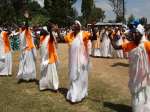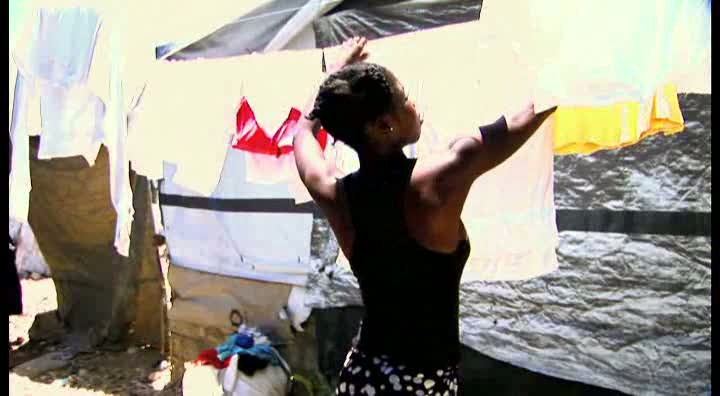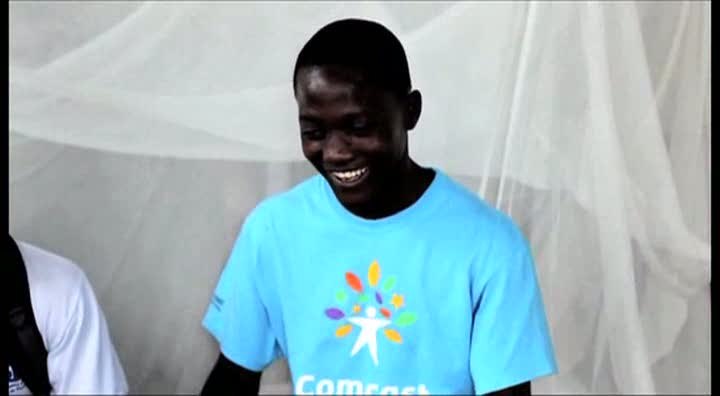Football match puts spotlight on Haitians in the Brazilian Amazon
News Stories, 2 June 2010
TABATINGA, Brazil, June 2 (UNHCR) – A recent football match in the heart of the Amazon put a spotlight on a small group of Haitians who have sought shelter and asylum in the north-west Brazilian town of Tabatinga, most of whom left their homeland after the devastating January 12 earthquake.
The game, organized last Friday by a UNHCR partner, pitted a team of Haitian exiles against locals and was watched by an enthusiastic crowd of Brazilians as well as Colombian and Peruvian visitors in an area of Amazonas state where the three countries meet.
Played on a sandy pitch and narrowly won by the Caribbean islanders, the match helped raise 80 kilogrammes of food for a group of around 60 civilians from Haiti living at the Divine Church of the Holy Spirit in Tabatinga. The food, including items such as rice, beans, salt, flour and oil, was the admission fee for spectators.
"Everybody enjoyed the event, especially the Haitians," said Father Gonzalo Franco, director of a local aid group called Pastoral da Mobilidade Humana, which works with UNHCR in the area. "The food collected demonstrates the solidarity of the citizens of Tabatinga for the [needy] Haitians in their city."
The Haitians, including children, have arrived in Tabatinga via the Dominican Republic and Peru since January's earthquake struck Port-au-Prince and surrounding areas, killing tens of thousands of people. A few of the Haitians have said they wished to remain in Brazil as refugees.
They have been receiving assistance from Pastoral under a UNHCR-funded programme aimed at providing emergency humanitarian assistance to Colombian asylum-seekers. Ironically, only four Colombians have sought refuge in Tabatinga this year to date. This compares to more than 80 Haitians, who have separately reached this city via the Dominican Republic and either Peru or Ecuador.
All have applied for asylum in Brazil and left for Manaus, capital of Amazonas, once they have received temporary documentation allowing them to stay. In Manaus, they receive assistance from UNHCR and are encouraged to become self-sufficient. Some subsequently abandon their asylum claims and disappear.
"We are considering the possibility that some are leaving for other countries, which indicates that they are only using Brazil as a stepping stone to somewhere else," said Andres Ramirez, UNHCR's representative in the country. "But, for humanitarian reasons, we will keep assisting the newcomers on a temporary and emergency basis," he added,
In line with international conventions, Brazil does not recognize people displaced by natural disasters as refugees. In these cases, asylum claims are forwarded by the National Committee for Refugees to the National Immigration Council, which can regularize their migratory status on humanitarian grounds. "This is a smart decision by the Brazilian government as it will support those Haitians who want to rebuild their lives in Brazil," Ramirez noted.
Meanwhile, Pastoral lets the group in Tabatinga use the facilities in the church and its buildings, including the kitchens. All worry about the situation back in Haiti, where huge numbers were forced to leave their homes after the quake struck. Some of them sought shelter or medical aid across the border in the Dominican Republic, including 32-year-old construction worker Enel Romelus.
"It´s impossible to describe the tragedy that took over my country. I feel that everything has gone and we have no place to return," said Romelus, explaining why he had decided to fly to the Peruvian capital, Lima, and then make his way to Tabatinga by bus and boat in early April. His wife, three children and father remain in Haiti.
Because he speaks Spanish, Romelus acts as an interpreter for the Haitians, who mostly speak French or Creole. That makes him very helpful for Pastoral as well as his compatriots, who seek his help to go shopping or during interviews with immigration officials. "I want a job to help my family still in Haiti," revealed Romelus, who said he wished to remain in Brazil.
Meanwhile encouraged by the success of the football match at building bridges between the Haitians and the local community, Father Gonzalo is planning another game. "It was a demonstration of solidarity with the Haitians at this very difficult time for them. Very soon, we will organize another match against a team of Colombians," he revealed.
By Luiz Fernando Godinho in Tabatinga, Brazil




































